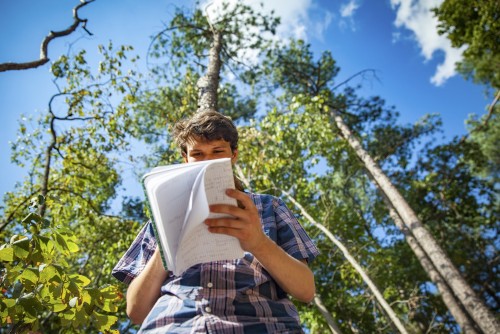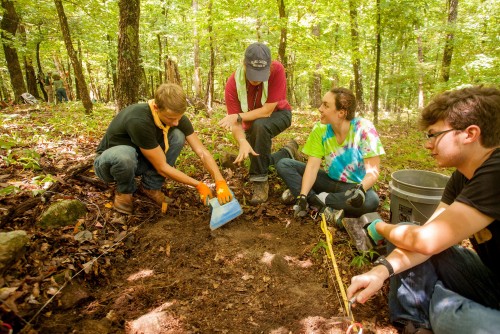Beneath our feet are layers of chronological lessons—stories about the earth. The study of geology allows you to read between the layers and see how time, materials, and change have shaped the structure of our planet.
Why study Geology at Sewanee?
Your geology classroom is on top of (and underneath) the 13,000-acre laboratory we call the Domain, with cliffs, bluffs, trails, and caves begging to be explored. You will learn how humans affect climate and learn how to use resources sustainably—protecting the planet’s inhabitants and their future.
Required coursework in geology is also integrated with coursework in forestry, soils, hydrology, chemistry, physics, and mathematics. Course topics include rocks, minerals, fossils, landforms, earthquakes, glaciers, volcanoes, and environmental pollutants. Students learn about climate change and geological features, while recognizing that the patterns of geological history allow us to forecast the earth’s future.
First Destinations: Geology Majors
Sewanee graduates secure positions in a variety of fields. Some you would expect, others, are a bit of a surprise. Sewanee prepares you for your profession and your passion. Below is a sampling of recent graduates' first job.
- Geosteering and Logging Geologist, Diversified Well Logging, LLC, Permian Basin, WV.
- Staff Geologist, TriAD Environmental Consultants, Nashville, TN.
- Surgical Assistant, Erlanger Hospital, Chattanooga, TN.
- Geologist, Geological Society of America, Canon City, CO.
GRADUATE SCHOOL & PREPROFESSIONAL PROGRAMS: GEOLOGY MAJORS
Sewanee graduates enjoy extraordinary acceptance rates to top graduate and preprofessional programs–about 95 percent to law school and over 85 percent to medical school. Below is a sampling of where Sewanee grads continue their education.
- M.A. in Geology, Louisiana State University.
- Professional Certificate, Geographic Information System, Georgia State University.




